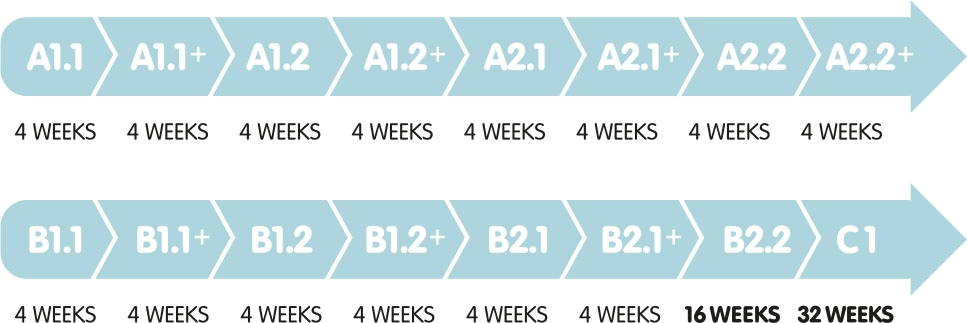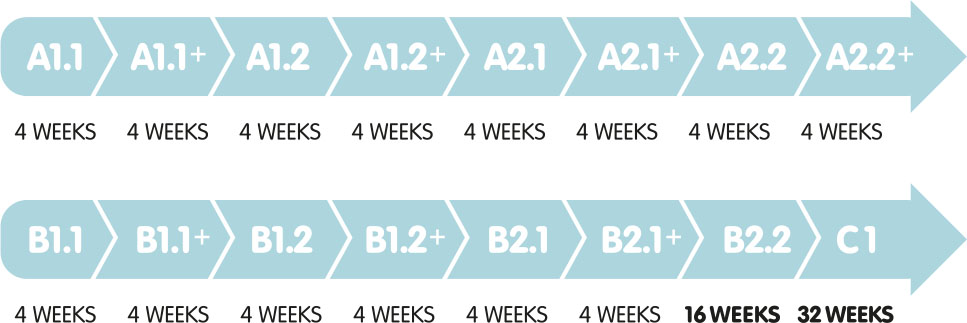Content of your German course
Find out more about the content of your intensive course
Sometimes it is not quite so easy to decide which level is the right level for you. A good
place to start is with our placement test which gives you a pretty good idea which course
you should sign up for. On top of that, we have designed this handy summary of topics that
you are going to cover in class. You will find a short description
and the important grammar and vocabulary aspects at a glance.
In our knowledgebase you can find a lot more information on
many other useful aspects regarding your language course.
You know you want to learn German, but you wonder what the letters A, B and C mean? It’s simple: They tell you how advanced your knowledge of a foreign language already is.
Generally, A means it’s the beginner level, B means it’s intermediate and C indicates the advanced level – but it’s a fluent passage between the levels. In accordance with the Common European Framework of Reference for Languages, we at speakeasy group our courses into these different levels.
Please note the different progression in intensive and evening classes - it is due to the number of lessons per week. The intensive course with four lesson days per week has twice as many appointments as the evening course with two lesson days per week.
Intensive courses:

Evening courses:

What better way to start learning a new language from scratch than jumping right
in and getting good at the basics? Our intensive course runs Monday – Thursday
and helps to build your confidence in navigating through commonplace situations,
such as shopping at the supermarket, asking for directions, ordering food and
drink at restaurants, and makings arrangements to meet people. You can also
develop some useful everyday vocabulary.
Here is a summary of what you are going to learn:
Vocabulary A1.1
Grammar A1.1
You’ve gained a firm grasp on the very basics and now you’d like to take it to
the next level. In the A1.2 course you will learn how to talk more in depth
about your thoughts and opinions, as well as how to state problems. You will
practice arranging appointments with friends, or even with the doctor. You will
also discuss holiday celebrations and more about the city you live in.
Here is your curriculum:
Vocabulary A1.2
Grammar A1.2
At this level, you’ll already be familiar with the most important words and
grammar rules. However, you may feel that in many everyday situations you still
lack the vocabulary or grammar. Fear not - in this course you will continue to
practice making appointments and requests. In this way, you will be able to
broaden your knowledge regarding various everyday situations. Main themes of
this course will expand on topics relating to leisure, holidays, and city life.
Here is an overview of the topics for A2.1:
Vocabulary A2.1
Grammar A2.1
At this level you will continue practicing expressing your opinions and wishes
using persuasive speech. You will tackle everyday life issues and experiences in
order to expand your vocabulary. Furthermore, you will focus on how to make
plans for the future!
A handy summary for your A2.2 intensive course:
Vocabulary A2.2
Grammar A2.2
Congratulations - If you’re doing this course, it means you are already at the
advanced level! In this course you will continue to expand your vocabulary
regularly and practice writing emails and formal letters. You’ll learn how to
write complaint letters, work related letters and motivation letters. You’ll
also start thinking about giving presentations- but don’t worry, you won’t be
asked to give one yet!
Your summary of B1.1:
Vocabulary B1.1
Grammar B1.1
At this level, you will continue to expand your vocabulary - even on topics that
aren’t necessarily used in daily life. You will talk about arts, history, and
cultural events. In addition, you will start making things even more interesting
by introducing more complex grammar structures as well as presentations.
These are the topics you will cover in your intensive course B1.2:
Vocabulary B1.2
Grammar B1.2
You’ve made it this far- well done! This course will focus on many different
general topics. You will also learn more complex vocabulary to do with everyday
life in varied situations such as talking on the phone, writing short texts,
discussing a topic and presenting ideas. You will look at authentic texts from
the press and begin reading something a bit more substantial - literature here
we come!
Here is an overview of topics:
Vocabulary B2.1
Grammar B2.1
Please note: The B2.2 level takes 2 months to complete. You may join the course
in any month.
At this level you will learn how to create meaningful coherent texts and longer
written statements such as university/work application motivation letters. You
will also continue to practice expressing yourself, as well as read meaningful
literary texts to do with love, food, health, and university.
The topics of your B2.2 class:
Vocabulary B2.2
Grammar B2.2
Please note: The C1 level takes 4 months to complete. You may join the course in
any month.
You’ve made it this far- we know it wasn’t easy so give yourself a pat on the
back! This is where you start fine tuning everything you have learned so far.
You will learn how to express yourself and write texts at a high level. You will
be introduced to a variety of sophisticated vocabulary to do with economy,
psychology, literature, and society. This is the course that will prepare you
for a professional life in Germany - be it at the work place, or university.
These are the topics of your C1 courses:
Vocabulary C1
Grammar C1
Learn more about the content of your evening course
Our placement test is a good place to start when searching for the right course. To help you
even more, we’ve compiled the following summary. A1.1, A1.1+, or A1.2? Here you can find all
the important details on the topics, grammar, and vocab that you are going to cover in each
level. This way, you know exactly what to expect when starting the course and what you will
be able to accomplish in German once you have completed the level!
In our knowledgebase you can find a lot more information on
many other useful aspects regarding your language course.
You know you want to learn German, but you wonder what the letters A, B and C mean? It’s simple: They tell you how advanced your knowledge of a foreign language already is.
Generally, A means it’s the beginner level, B means it’s intermediate and C indicates the advanced level – but it’s a fluent passage between the levels. In accordance with the Common European Framework of Reference for Languages, we at speakeasy group our courses into these different levels.
Please note the different progression in intensive and evening classes - it is due to the number of lessons per week. The intensive course with four lesson days per week has twice as many appointments as the evening course with two lesson days per week.
Intensive courses:

Evening courses:

Are you new in Berlin? Or maybe you have lived here for a while but feel that
the language barrier is holding you back? The A1.1 course will allow you to get
a grip on the monster we call the German language. You’ll learn how to ask and
answer important questions in your daily life. Furthermore, you will become
acquainted with the German alphabet, numbers, and many verbs in the present
tense.
Here is a summary of topics for your A1.1 course:
Vocabulary A1.1
Grammar A1.1
You’re new in Berlin and have already completed an A1.1 evening class? Or you
already possess some basic vocabulary in German? In this follow-up course to
your first A1.1 evening class (the “+” designates that this is a follow-up
evening course), you will cover the second half of the A1.1 level. You will
learn how to get by with the basics: Talking about activities and hobbys, asking
for directions, ordering food and drinks at the restaurant, and making plans to
meet friends. We’ll be focusing on the past tense called 'Perfekt' with the
haben verb, and the German sein (the auxiliary verbs).
This is your summary for A1.1+:
Vocabulary A1.1+
Grammar A1.1+
Would you like to master everyday conversations? In the A1.2 course you will
learn how to ask for information, as well as how to express your thoughts and
wishes. You will practice making plans with friends, and how to book an
appointment with the doctor. You will also learn a lot about our city of Berlin,
Germany in general, and other German speaking countries.
This is what you are going to cover in your A1.2 class:
Vocabulary A1.2
Grammar A1.2
In the follow up course of your A1.2 evening course (the “+” designates that
this is a follow-up evening course), you’ll be tackling the second half of the
A1.2 level. This is where you’ll learn to manoeuvre through everyday life in
Germany. You will continue to practice asking for information, as well as
expressing your wishes. Other topics will be small talk, household chores,
celebrations and holidays. Life in Berlin is very busy… we’ll need to talk about
it!
Your summary of topics for A1.2+:
Vocabulary A1.2+
Grammar A1.2+
Well done! At this stage, you probably already have a good grasp on some of the
most frequently used vocabulary and grammar structures. But perhaps you
sometimes feel a little out of your depth in taking conversations to the next
level. This course will delve deeper into some commonplace scenarios you may
find yourself in, but more importantly, you’ll focus on how to formulate
requests and make suggestions. We will also cover many new adjectives and learn
how to declinate them - a giant step towards a richer language ability!
Here is your outline for A2.1:
Vocabulary A2.1
Grammar A2.1
In this follow-up course of your A2.1 evening course (marked with a +) we will
conquer the second half of the A2.1 level. You are going to deepen your basic
knowledge and vocabulary and extend the linguistic resources needed for your
everyday life in Berlin. You will learn how to order something, as well as how
to give advice and show gratitude. Let’s get started!
Your topics in your A2.1+ evening course:
Vocabulary A2.1+
Grammar A2.1+
As you progress in this level, you will delve into the many topics and themes of
daily life such as the media, travelling and climate change. Your vocabulary
will grow rapidly as well as your knowledge of German grammar. Is there anything
in specific you would like to cover in class? Suggestions are very welcome!
This is your curriculum for A2.2:
Vocabulary A2.2
Grammar A2.2
In the follow-up course to your A2.2 evening class (noted with a +) you’ll study
the second half of the A2.2 level and continue to practice applying complex
sentence structures correctly to your everyday life. This course will deepen
your knowledge on how to express your opinions and wishes. You will also learn
how to express enthusiasm and dissatisfaction. In addition, you will learn many
new words useful to various areas in your daily life.
Find out more about the content of your A2.2+ evening course:
Vocabulary A2.2+
Grammar A2.2+
Great news! If you have reached this level, you are already at an advanced stage
in your language learning. At this point, you will enlarge your vocabulary base
and will build on your confidence with more complex and more formal use of
grammar. We will continue to practise Akkusativ and Dativ until you could even
use it in your sleep.
Here are the topics for your B1.1 evening course:
Vocabulary B1.1
Grammar B1.1
In the follow-up course to your B1.1 evening class (marked with +) you’ll
complete the second half of the B1.1 level and expand your knowledge of complex
grammar. In order for the new language to feel spontaneous, you will mostly be
talking about yourself and your life. You will also gain confidence in more
official scenarios that involve letter writing or giving presentations.
What you are going to cover in B1.1+:
Vocabulary B1.1+
Grammar B1.1+
This is the stage where you will learn how to discuss a much wider range of
conversational topics, such as history, arts and politics. You will expand on
your ability to use elaborate grammar structures and progress in your ability to
write formal applications for jobs or further education.
Here are the themes and topics covered in the B1.2 evening course:
Vocabulary B1.2
Grammar B1.2
In the follow-up course to your B1.2 evening course (marked with +) you will
continue to expand your vocabulary and you will learn how to debate. You don’t
believe in climate change or you’re into raw diets? At this level you will learn
how to express your opinions on complex themes, and how to argue and oppose
other people’s ideas.
Here is an overview of your topics in B1.2+:
Vocabulary B1.2+
Grammar B1.2+
At this level you will continue to express yourself and your opinions not just
on a wide range of general topics but also in your area of specialisation. You
will continue to build on your already solid grammar base and gain more
vocabulary relating to areas of media and professional life.
Find out in detail what you’re going to cover in B2.1:
Vocabulary B2.1
Grammar B2.1
In the follow up course to your B2.1 evening course (marked with +) you will
complete the second half of the B2.1 level. In this course you will further
train and practice fluent and correct speaking- whether you are talking on the
phone or speaking to a group. You will talk about different subjects at a high
level. You will also expand on the complex grammatical structures you already
possess so that you are able to express yourself well in formal situations, as
well as in informal ones.
Here is your summary of topics:
Vocabulary B2.1+
Grammar B2.1+
(In order to complete all the subjects in this module you will require 4 months
of an evening course. You can join the course in any month.)
During the course you will focus on creating more in-depth texts and longer
written statements such as applications for employment or university. You will
also continue to practice expressing yourself in a natural and spontaneous way.
By reading more complex literary texts to do with relationships, nutrition, and
further education, you will continue to grow your vocabulary and confidence with
complex grammar structures.
Here is your curriculum for B2.2:
Vocabulary B2.2
Grammar B2.2
(In order to complete all the subjects in this module you will require 8 months
of evening courses. You may join the course in any month.)
Congratulations – it’s a massive achievement to have made it this far! At this
level, you will continue to develop everything you covered in previous lessons.
By expressing your opinions and writing more complex texts, you will get an
introduction to a variety of advanced vocabulary regarding literature, society,
economy, and psychology. Topics covered in this course will help to prepare you
for building a life in Germany – whether that is in further education or
employment.
This is what you are going to learn in C1:
